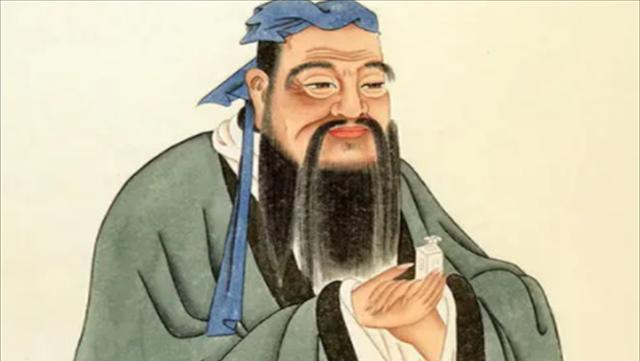As we all know, Zhuangzi is a representative figure of the Chinese Taoist school, and together with Lao Tzu is called "Lao Zhuang". His philosophical ideas played a very important role in the formation of Taoist thought. For the "Confucianism" pioneered by Confucius, Zhuangzi has always been non-committal. However, in his "Zhuangzi Zhenzhen" section, he put forward the view that "saints do not die, and great thieves do not stop". So is this saint related to Confucius? Let's move on.
The saints do not die, and the great thieves do not stop
Because Confucius founded the Confucian school, he was revered by posterity as a "wensheng". In the eyes of many people, the first "saint" in Chinese history was him. But the "saints" zhuangzi refers to not specifically Confucius. To understand the meaning of Zhuangzi's words, it must be viewed in context. Zhuangzi originally said: "If the saint is dead, then the great thief cannot afford it, and the world is peaceful for no reason." The saints do not die, and the great thieves do not stop. Although the saints are heavy and the world is ruled, it is a heavy profit and theft. ”

Confucius
This means: "When the saint dies, the great thief will not rise again, and the world will be at peace without change." If the saint does not die, the great thief will not stop. Despite the reuse of saints to rule the world, the thief still gets the greatest benefit. Why is it that if there are "saints", there must be great thieves? This contains Zhuangzi's philosophical thought.
Zhuangzi
In addition to the Taoist emphasis on "Taoist nature" and "rule by inaction", another core viewpoint of Taoism is the "theory of qi things". In their view, without poverty, there is no wealth. It is also the existence of the gap between the rich and the poor that makes people greedy. In terms of class, if there is no nobility, there is no lowliness, and this artificially established concept has caused discrimination between classes. In the same way, without saints, there would be no great thieves. It is precisely because some people have seized the supremacy of morality and restrained others with their own ideas that many people with "moral defects" will appear.
Zhuangzi's point of view
According to Zhuangzi's point of view, the so-called "filial piety, compassion, benevolence, righteousness, loyalty, faith, chastity, and honesty" and other behaviors are all things that are destroyed by humanity and artificially flaunted. For example, the Confucian emphasis on "filial piety" has always been valued by successive dynasties. Especially in the Han Dynasty, one of the ways for ordinary people to become officials was to "raise filial piety and honesty". The titles of the emperors of the Han Dynasty also added the word "filial piety", such as the titles of Emperor Xiaowen of Han and Emperor Xiaowu of Han. But is this manifestation of "filial piety" really "filial piety"?
The Great Thief
There is no concept of "filial piety" in the animal kingdom, they just do things by instinct. But the crows feeding back and the lambs kneeling continue in these two groups. Could it be that the ravens and the elders of the flock are also educating the next generation? It's just nature that makes it so. Since "filial piety" has been defined, there have been various rules and regulations to monitor your behavior. If you don't do one of them, it's "filial piety." The whole society is competing with filial piety, but in the end there will still be people who are "unqualified". So there is a contrast between "filial piety" and "filial piety". Those who were originally filial to the tao became members of the "great thieves."
emperor
In addition, Zhuangzi also said in the "胠箧": "He who steals the hook is cursed, and the thief of the country is the prince, and the door of the princes is benevolent and righteous." "Whoever steals small things such as belts and hooks is sentenced to death, but those who steal the whole country become princes." Because they became princes, it was up to them to judge whether they were "benevolent or righteous." Isn't this stealing "benevolence" and "wisdom"? Don't those who follow them for the sake of fame and fortune turn black and white upside down?
thief
It is precisely because these so-called "saints" constantly put forward new ideas and moral laws that society has been turbulent. After all, there is no harm without contrast. For example, the issue of observing the festival after the widowhood of a woman in ancient times should actually be left to women to choose freely.
Some people have always wanted to remarry their husbands, and we need to respect their choices. Some women have a difficult life and want to rely on remarriage to relieve the pressure of life, and they should not interfere too much. However, because of the deliberate reinforcement of Zhu Xi and others, women were put on moral shackles, and women of the Song, Yuan, Ming, and Qing dynasties were all fighting for the chastity archway. But do they really want to either? This is not the case.
sage
Therefore, Zhuangzi's "saints do not die, and great thieves do not stop", which means that do not use your own moral standards to coerce others, such coercion will cause social disharmony. Man is neither a saint nor an evil man, so don't always talk about grandiose truths, but understand others from the perspective of human nature. Without absolute saints and wicked men, as long as no one seizes the moral high ground, nothing evil can happen. Think about it, is this the truth?
Reference: Zhuangzi